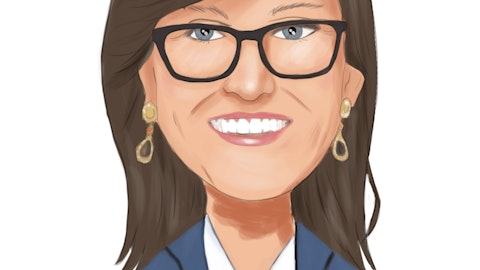Alesia Haas: Thanks for the question. So it’s a good chance for me to just remind everybody that when we look at the weighted average fees by taking our transaction revenues divided by volume, it’s an output, not an input. And so mix and behavior on our platform are really important drivers of what that output is in terms of blended fee rates. We’ve shared with you in Q1 earlier this year where we did increase spread on simple trading. So that is for an example, if we went back to the volumes and the mix we saw in 2021, we would see higher fees on the platform as a result of that Q1 decision. But we would see fees that looked much more like the 2021 fees if the mix shift because as we’ve shared over the last two quarters, we’ve seen more volume reduction in our advanced trade than we have in our simple trade.
And so today, more and more of the volume is coming from the simple trade products than it did in past periods. So I would say mix is a very critical input into what that resulting fee rate is. As we’ve said before, our fees are transparent, they’re disclosed to our customers, and so customers get the choice of how they transact on our platform, and possible behavior shifts over time, but this is the behavior that we’re seeing today, and we will be transparent with you and talk about how that shifts in future market conditions.
Operator: Your next question comes from the line of Joseph Vafi with Canaccord. Your line is open.
Joseph Vafi: Hey, everyone. Thanks for taking my question here this afternoon. Maybe Brian, could you give us the latest from your team in Washington on the legislative front? I know obviously Congress has been a little bit preoccupied with the speaker and the like. But it does feel like legislation coming out of the Congress could ultimately be kind of a silver bullet relative to the current environment of regulation by enforcement? Thank you.
Brian Armstrong: Yes. Sure. Happy to give an update. So we’ve certainly been very focused on getting clarity in the U.S. I do think it’s a major issue that’s holding back the U.S. right now. And although we’ve been able to make great progress in other countries in terms of licensing in the meantime and with our derivatives license here in the U.S., we still need to get more clarity. So there is a few things we can do on that front. One of them is our SEC case. I think hopefully we’ll get some clarity from the courts there next year or at some point. And the other one is, Stand with Crypto. So I mentioned that at the beginning, we’re really trying to activate the 52 million Americans who own crypto to come out in force in this 2024 election, make their voice heard.
Make sure that folks in DC recognize that nine out of 10 Americans don’t feel the current financial system is serving them. And there’s enough Americans now that have used this technology. It’s actually, 5x the number that own electric vehicles and 3x the number that have Union cars, right. They don’t recognize the scale of it quite yet. But we’ve now seen over a 100,000 people kind of raise their hands and say, I want to be an advocate for crypto, on standwithcrypto.org, which I encourage people to check out if they haven’t. And we’ve been able to sort of drive that towards comment letters with the IRS, calling their representatives in Congress. And so some of the things we’ve been asking them to talk to Congress about is what you mentioned, the legislation.
So there are a couple of bills that for those who aren’t – that don’t know, there are a couple of bills that got approved bipartisan support through the House committees. This is the FIT21 bill stands for the financial innovation and technology 21st century. So FIT21 is one of those. There’s also a stablecoin bill in the Senate, the Lummis and Gillibrand have some legislation they’re working on. And so I would say of the folks that I meet with in D.C., the majority opinion 80% of people I talk to is, it’s a pretty common sense approach. They say this is interesting new technology. We don’t exactly know how it could be useful, but it has some innovation potential, but let’s make sure we protect consumers so they won’t get harmed, make sure we don’t have any more blow-ups.
And also, let’s make sure America doesn’t get left behind. I mean, 83% of the G20 countries are already working on legislation here, why isn’t the U.S.? And so I know Patrick McHenry now that the kind of question marks about who is going to be speaker have passed. He’s publicly said that it’s a priority for him to get back to advancing crypto legislation. So I’m optimistic that America will get this right. And whether it’s through the courts or through Congress passing legislation or the 2024 election, America is going to get this right. We’re going to make sure that happens. And the 52 million Americans that have used crypto are going to make sure that happens more importantly.
Operator: Your next question comes from the line of Ben Budish with Barclays. Your line is open.
Benjamin Budish: Hi. Good evening, and thanks for taking the question. I wanted to follow-up on the earlier question around the transaction fees. You talked a little bit in the Q&A about the mix, but just kind of parsing your words very carefully from the prepared remarks, you said you may raise fees and then later you said you wouldn’t raise fees in response to the ETF. So I guess, could you perhaps remind us like what are the considerations there? I know you’ve sort of changed the approach more recently to think about balancing the output of volume and revenues, you no longer just optimizing for volumes, but how are you thinking about potentially – and I guess, maybe I don’t mean to misinterpret your words, if you mean may raise them, you may lower them. But how are you thinking about adjusting them in the future? Thanks.





